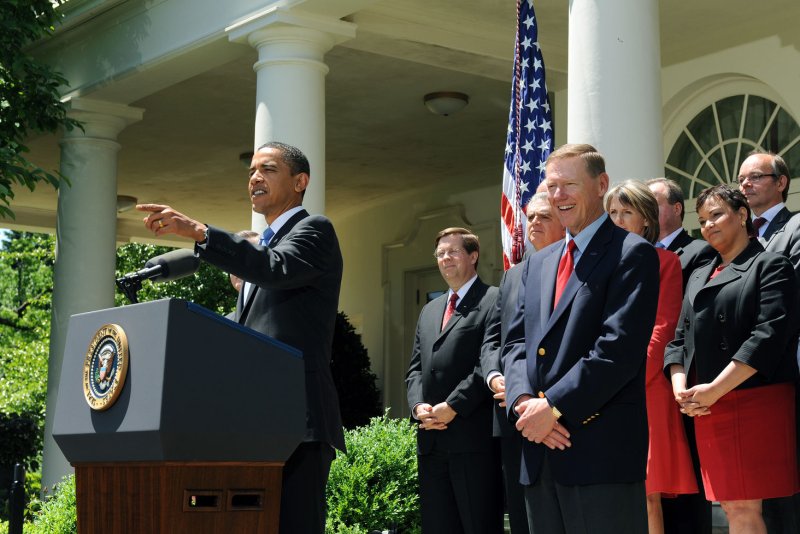U.S. President Barack Obama announces tightening of auto emissions and efficiency standards in the Rose Garden of the White House in Washington on May 19, 2009. With Obama are heads of auto companies, administration officials and environmental leaders. (UPI Photo/Roger L. Wollenberg) |
License Photo
WASHINGTON, March 3 (UPI) -- No more sulfur in gasoline -- that's the gist of new regulations from the Environmental Protection Agency, which announced stricter limits on the substance linked to smog and higher rates of respiratory disease.
Current regulations already cap the amount of sulfur allowed in gasoline, but the newly proposed rules would force oil companies to further minimize the chemical's presence in oil and gas products -- a two-thirds cut from today's limit of 30 parts per million down to 10 parts per million.
When sulfur is burned in gasoline, it prevents the pollution control technology in new cars from working to their full effect, thus leading to increased emissions.
“There is no other regulatory strategy that is as important from a health standpoint, in the foreseeable future,” S. William Becker, director of the National Association of Clean Air Agencies, told The New York Times.
The EPA says that by 2030, smog and pollution reduction resulting form the rule change will earn anywhere between $6.7 billion and $19 billion annually in economic benefits, thanks to lives saved and fewer work and school days missed due to respiratory illnesses. The agency says the costs of implementing the changes will have minimal effect on gasoline prices.
Not surprisingly, the oil industry disagrees with the EPA's math, and has characterized the new regulations as federal overreach.
“This rule’s biggest impact is to increase the cost of delivering energy to Americans, making it a threat to consumers, jobs, and the economy,” Bob Greco, head of the American Petroleum Institute, told Bloomberg. “But it will provide negligible, if any, environmental benefits. In fact, air quality would continue to improve with the existing standard and without additional costs.”
The auto industry has generally been more friendly to Obama's efforts to curb car emissions and other types of pollution.
“We understand that this is the trend, to get cars cleaner and cleaner,” Gloria Bergquist, vice president of the Alliance of Automobile Manufacturers, told The New York Times. “Our engineers are prepared to work for it.”
Obama and his administration have been tightening auto emissions standards a top priority since he's been in the White House.
[The New York Times]
[Bloomberg]















